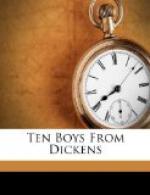This enraged Quilp’s boy, who sprang upon Kit, and the two were engaged in a hand-to-hand fight, when Quilp appeared and separated them, asking the cause of the quarrel, and was told that Kit had called him, “The ugliest dwarf that could be seen anywheres for a penny.” Poor Kit never dreamed that his unguarded remark was to be treasured up against him in the mind of the jealous, vindictive, little dwarf, and used to separate him from his idolised mistress and her grandfather, but it was even so, for there was a power of revenge, a hatred, in the tiny body of the dwarf, entirely out of proportion to his size.
Quilp at this time desired to injure the old man and his grandchild, and soon made several discoveries in a secret way, which, added to what he found out from little Nell’s own artless words about her home life, and her grandfather’s habits, enabled him to put two and two together, and guess correctly for what purpose the old man borrowed such large sums from him, and he refused him further loans. More than this, he told the old man that he (Quilp) held a bill of sale on his stock and property, and that he and little Nell would be henceforth homeless and penniless.
The old man pleaded, with agony in his face and voice for one more advance,—one more trial,—but Quilp was firm.
“Who is it?” retorted the old man, desperately, “that, notwithstanding all my caution, told you? Come, let me know the name,—the person.”
The crafty dwarf stopped short in his answer, and said,——
“Now, who do you think?”
“It was Kit. It must have been the boy. He played the spy, and you tampered with him.”
“How came you to think of him?” said the dwarf. “Yes, it was Kit. Poor Kit!” So saying, he nodded in a friendly manner, and took his leave; stopping when he passed the outer door a little distance, and grinning with extraordinary delight.
“Poor Kit!” muttered Quilp. “I think it was Kit who said I was an uglier dwarf than could be seen anywhere for a penny, wasn’t it? Ha, ha, ha! Poor Kit!”
And with that he went his way, still chuckling as he went.
That evening Kit spent in his own home. The room in which he sat down, was an extremely poor and homely place, but with that air of comfort about it, nevertheless, which cleanliness and order can always impart in some degree. Late as the Dutch clock showed it to be, Kit’s mother was still hard at work at an ironing-table; a young child lay sleeping in a cradle near the fire; and another, a sturdy boy of two or three years old, very wide awake, was sitting bolt upright in a clothes-basket, staring over the rim with his great round eyes. It was rather a queer-looking family; Kit, his mother, and the children, being all strongly alike.
Kit was disposed to be out of temper, but he looked at the youngest child, and from him to his other brother in the clothes-basket, and from him to his mother, who had been at work without complaint since morning, and thought it would be a better and kinder thing to be good-humoured. So he rocked the cradle with his foot, made a face at the rebel in the clothes-basket, which put him in high good-humour directly, and stoutly determined to be talkative, and make himself agreeable.




